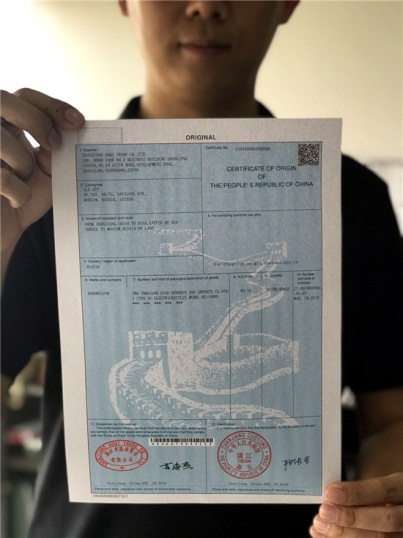Home> News
Zhanjiang Customs gets first self-printed certificate of origin
On April 10, the first self-printed certificate of origin for enterprises in Zhangjiang, Guangdong province came out.
Su Haiyan, a worker at Zhangjiang Aoqi Trading Co., Ltd, received a certificate of origin of Russian commodities via the self-printing service.
"To get a certificate of origin before, we had to go to Customs for examination, a signature, and a seal. Now with self-printing, as long we have computers and color printers, we can do it ourselves in five minutes in the company," Su said.
Zhanjiang Customs, along with 11 other counterparts, started introducing the self-printing service for certificates of origin in late March under the guidance of the General Administration of Customs, which aims to optimize the business environment.

Su Haiyan, a worker at a trade company in Zhanjiang, Guangdong province, receives a certificate of origin of Russian commodities via self-printing service on April 10. [Photo/gdzjnews.com.cn]
Fifteen kinds of certificate of origin are allowed to be self-printed under the service, including a China-Australia certificate of origin, China-New Zealand certificate of origin, China-Pakistan certificate of origin, China-Chile certificate of origin, and China-Switzerland certificate of origin.
This move is another significant reform launched by the General Administration of Customs following after simplifying company registration procedures and paperless declaration, which greatly reduces the application period for certificates of origin.
To ensure that the self-printing service is properly implemented, Zhanjiang Customs issued operation manuals via WeChat and QQ chat groups, and also visited local enterprises to teach them the operation procedures.
In the first three months of this year, Zhanjiang Customs has issued 3,911 certificates of origin, with the cargo value worth $260 million in total, and has helped export enterprises gain tariff preferences of about $7.22 million from countries of destination.

 Print
Print Mail
Mail 5G construction supports Zhanjiang's high-quality development
5G construction supports Zhanjiang's high-quality development
 Acting mayor inspects project construction in Xuwen, Leizhou
Acting mayor inspects project construction in Xuwen, Leizhou Zhanjiang island an "egret paradise"
Zhanjiang island an "egret paradise"  Dancing egrets add vitality to Xiashan
Dancing egrets add vitality to Xiashan